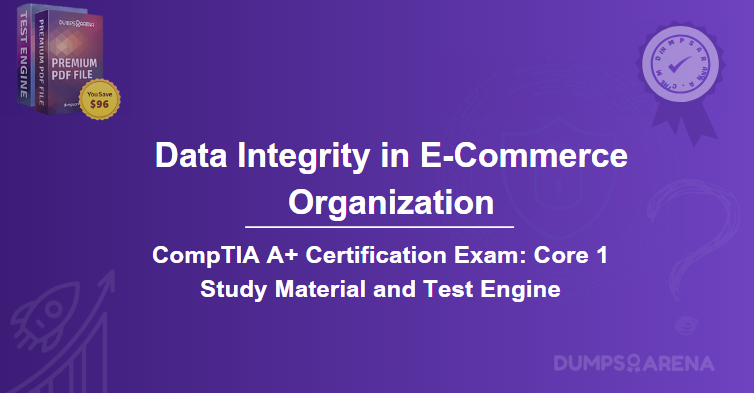Introduction
In the digital age, e-commerce organizations handle vast amounts of sensitive data, including customer details, payment information, and transaction records. Ensuring data integrity—the accuracy, consistency, and reliability of data throughout its lifecycle—is critical for maintaining trust, compliance, and operational efficiency.
This article explores the importance of data integrity in e-commerce, its role in cybersecurity frameworks like the CompTIA Security+ (SY0-701) exam, and how platforms like DumpsArena help professionals master these concepts for certification success.
Understanding Data Integrity in E-Commerce
What Is Data Integrity?
Data integrity refers to the maintenance and assurance of data accuracy and consistency over its entire lifecycle. It ensures that data remains unaltered, uncorrupted, and reliable during storage, retrieval, and transmission.
Why Is Data Integrity Crucial for E-Commerce?
E-commerce businesses rely on data for:
- Customer transactions (payment details, shipping addresses)
- Inventory management (product listings, stock levels)
- Marketing analytics (customer behavior, preferences)
- Regulatory compliance (GDPR, PCI-DSS, CCPA)
A breach in data integrity can lead to:
- Financial losses (fraudulent transactions, chargebacks)
- Reputation damage (loss of customer trust)
- Legal penalties (non-compliance fines)
Key Threats to Data Integrity in E-Commerce
1. Cyberattacks & Data Breaches
- SQL Injection: Hackers manipulate databases to alter or steal data.
- Man-in-the-Middle (MITM) Attacks: Data is intercepted and modified during transmission.
- Ransomware: Attackers encrypt data, demanding payment for its release.
2. Human Errors
- Incorrect data entry (typos, mislabeling products)
- Improper data handling (unauthorized modifications)
3. System Failures
- Hardware malfunctions (server crashes, disk failures)
- Software bugs (corrupted databases, glitches)
4. Insider Threats
- Disgruntled employees altering or deleting records
- Negligent staff mishandling sensitive data
How E-Commerce Organizations Ensure Data Integrity?
1. Encryption & Secure Protocols
- SSL/TLS encryption secures data in transit.
- End-to-end encryption (E2EE) protects stored data.
2. Access Controls & Authentication
- Role-Based Access Control (RBAC) limits who can modify data.
- Multi-Factor Authentication (MFA) prevents unauthorized access.
3. Data Validation & Error-Checking
- Input validation ensures only correct data formats are accepted.
- Checksums & hashing verify data consistency.
4. Backup & Disaster Recovery
- Automated backups prevent data loss.
- Redundant storage ensures data availability.
5. Compliance with Data Protection Laws
- GDPR (General Data Protection Regulation)
- PCI-DSS (Payment Card Industry Data Security Standard)
Data Integrity in the CompTIA Security+ (SY0-701) Exam
The CompTIA Security+ (SY0-701) certification validates IT professionals' skills in cybersecurity, including data integrity concepts. Key exam topics include:
1. Cryptography & Data Protection
- Hashing algorithms (SHA-256, MD5) ensure data integrity.
- Digital signatures verify authenticity.
2. Secure Network Architecture
- Firewalls & IDS/IPS prevent unauthorized data alterations.
- VPNs secure data in transit.
3. Risk Management & Compliance
- Data retention policies ensure integrity over time.
- Audit logs track modifications for accountability.
Professionals preparing for the SY0-701 exam must understand how data integrity impacts cybersecurity strategies.
How DumpsArena Helps in CompTIA Security+ Exam Preparation?
For aspiring cybersecurity professionals, DumpsArena offers:
1. Updated SY0-701 Practice Questions
- Realistic exam simulations to test knowledge on data integrity, encryption, and compliance.
2. Detailed Study Guides
- Explanations of data integrity best practices relevant to e-commerce security.
3. Interactive Learning Tools
- Flashcards, quizzes, and case studies on data protection mechanisms.
4. Expert Support
- Guidance from certified professionals on tackling data integrity questions in the exam.
By using DumpsArena, candidates gain a competitive edge in mastering SY0-701 topics, including e-commerce data security.
Conclusion
Data integrity is non-negotiable for e-commerce organizations. It safeguards financial transactions, customer trust, and regulatory compliance. For cybersecurity professionals, understanding data integrity is essential for the CompTIA Security+ Exam and real-world applications.
Platforms like DumpsArena provide the necessary resources to excel in certification exams while reinforcing best practices in data security. By prioritizing data integrity, e-commerce businesses can minimize risks, enhance reliability, and sustain growth in a competitive digital marketplace.
Get Accurate & Authentic 500+ Comptia SY0-701 Exam Questions
1. Why is data integrity critical in an e-commerce organization?
a) It improves website design aesthetics
b) It ensures accurate, consistent, and reliable data for transactions
c) It reduces the number of customer complaints
d) It increases social media engagement
2. Which of the following is a consequence of poor data integrity in e-commerce?
a) Faster website loading times
b) Increased customer trust
c) Incorrect order fulfillment and financial losses
d) Higher search engine rankings
3. Data integrity helps prevent which of the following issues in e-commerce?
a) Duplicate product listings
b) Secure payment gateways
c) Increased website traffic
d) Better customer reviews
4. Which regulatory compliance requirement emphasizes the need for data integrity in e-commerce?
a) GDPR (General Data Protection Regulation)
b) OSHA (Occupational Safety and Health Administration)
c) FCC (Federal Communications Commission)
d) FAA (Federal Aviation Administration)
5. How does data integrity impact customer trust in an e-commerce business?
a) It has no effect on customer trust
b) It decreases transparency
c) It ensures accurate product details and order processing, increasing trust
d) It only benefits large corporations
6. Which of the following is a method to maintain data integrity in e-commerce?
a) Regularly deleting customer data
b) Using input validation and encryption
c) Ignoring server errors
d) Reducing backup frequency
7. What role does data integrity play in inventory management for e-commerce?
a) It helps prevent stockouts and overselling
b) It increases shipping costs
c) It slows down order processing
d) It has no impact on inventory
8. A breach in data integrity could lead to:
a) Improved customer loyalty
b) Legal penalties and reputational damage
c) Higher website performance
d) Increased employee productivity
9. Which database feature helps enforce data integrity in e-commerce systems?
a) Random data shuffling
b) Foreign key constraints
c) Disabling backups
d) Manual data entry only
10. Why is real-time data synchronization important for data integrity in e-commerce?
a) It ensures all systems display consistent and up-to-date information
b) It reduces the need for customer support
c) It increases website downtime
d) It eliminates the need for databases



